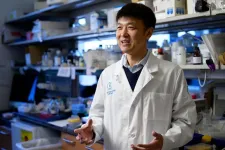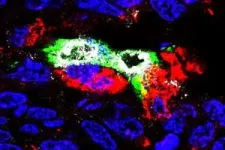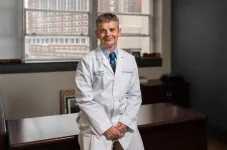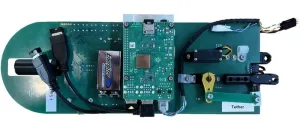(Press-News.org) Investigator Ming Li, PhD, has dedicated his career to understanding the intricate workings of the immune system — both in general and for the critical role it plays in cancer.
Study by study, his lab at Memorial Sloan Kettering Cancer Center (MSK) is sharing new insights into the molecular and cellular mechanisms involved in immune regulation — a type of knowledge-building that scientists call “basic science” or “discovery science.” But Dr. Li is equally focused on applying that knowledge to harness the power of the immune system against cancer.
“Immunotherapy has become a really important area in cancer research,” says Dr. Li, a member of the Immunology Program at the Sloan Kettering Institute, a hub for basic and translational research within MSK. “The idea that we can engage the immune system to control cancer is something that many cancer biology labs are now pursuing.”
For example, in a new study in Immunity, one of the top immunology journals, Dr. Li and his colleagues describe a tumor suppression pathway they believe could form the basis for a new immunotherapy approach.
We recently sat down with Dr. Li to discuss the new findings and his research program at MSK.
What are the big questions your lab is trying to answer to understand the immune system and make cancer immunotherapy more effective?
First and foremost, we are interested in how the immune system is regulated at a mechanistic level. That means doing experiments to understand in precise detail the mechanisms by which immune cells interact and coordinate to mount an immune response against threats to an individual’s health.
Cancer cells pose a unique challenge for the immune system. They are a person’s own cells, but they can act like foreign invaders. And cancer has ways of hijacking the immune system for its own benefit.
How the immune system recognizes bacteria and other infections has been well studied. But how it recognizes a healthy cell that’s transforming into a cancer cell is still a relatively new discipline.
I started my lab in 2007, and over the past 16 years we’ve investigated the diverse ways that the immune system perceives and responds to cell transformation.
During this same period, the development of immunotherapy has revolutionized cancer treatment worldwide — that is, tapping into the power of a person’s immune system to fight against their cancer. When it works, it can have amazing results. The challenge is making it work for more people and more types of cancer.
In my lab, we’re uncovering new biological insights with the aim of doing exactly that.
Tell us about some of the important discoveries from your lab and how they might inform future therapies.
I think our work has helped to expand ideas about how we might go about targeting the immune system for cancer therapy.
My lab is primarily focused on a type of white blood cells called lymphocytes, including T lymphocytes. T cells recognize abnormal cells and target them for destruction. They play a central role in the immune response that is known as “adaptive,” because it learns to identify the invader and can remember how to attack it.
We discovered that a type of adaptive T cells called “helper T cells” are regulated by the TGF-beta pathway to control the tumor immune response. Blocking TGF-beta signaling in helper T cells creates a defensive response that could be used against cancer. This approach underscores the idea of targeted immunotherapy approaches for complex regulators such as TGF-beta.
Today, adaptive lymphocytes are the main focus of programs to develop checkpoint inhibitor therapies, to which the helper T cell-directed TGF-beta blockade belongs. But we discovered that two additional types of tumor-resident lymphocytes called “type 1 innate lymphoid cells” and “killer innate-like T cells” play an important role in cancer immune surveillance. That’s the process by which the immune system detects and eliminates newly transformed cancer cells to prevent the development of tumors.
Our first paper on this topic was published in 2016, and we’ve had several additional follow-up studies that took our initial findings in mouse models into a human context, and identified interleukin-15 as a pivotal regulator of these newly discovered cancer immune surveillance responses. These include recent papers in Nature, Nature Immunology, and Science Immunology.
We are optimistic that the ability to activate these tissue-resident innate lymphocytes and innate-like T cells could be developed into a next-generation immunotherapy.
Meanwhile, there’s a whole separate arm of our research program that is looking at the role of macrophages in cancer. Macrophages are a different type of white blood cell that engulfs and digests invaders, like bacteria and cancer cells.
Macrophages play a complicated role in cancer because macrophages found in and around tumors — what we call tumor-associated macrophages — can actually support tumor growth.
We published a paper this summer in Nature that showed tumor-associated macrophages can be reprogrammed to outcompete certain cancer cells for resources. And these findings suggest that this pathway might be harnessed against aggressive cancers that are fueled by cell competition.
What about the new study, what did it reveal about the role of macrophages in cancer?
The new study in Immunity was also one that focused on tumor-associated macrophages, which we call TAMs for short.
The work — which was co-led by former lab members Mytrang Do, MD, PhD, and Wei Shi, PhD, and current postdoc Liangliang Ji, PhD — showed how tumors make a favorable environment for their growth by promoting the infiltration of TAMs into the tumor.
Using a mouse model of breast cancer, we found that TAMs found inside tumors had low activity of a key metabolic regulator called mTORC1. We also found that depleting a protein that blocks mTORC1 activity in these cells helped to reduce tumor growth by blocking blood vessel growth and cutting off cancer cells from access to oxygen.
So we see this as another opportunity to harness the power of the immune system to fight cancer — in this case, by increasing mTORC1 signaling within these tumor-associated macrophages to prevent the generation of a supporting tumor tissue blood vasculature.
Ultimately, we believe there’s great hope for precision immuno-oncology — that is, using the diverse immunotherapy weaponry tailored to the specific cancer threat of an individual patient. This is a very exciting time in immunotherapy discovery, and I’m privileged to be able to contribute to making immunotherapy work better and for more people.
END
How one lab at MSK is working to harness the power of the immune system against cancer
2023-11-14
ELSE PRESS RELEASES FROM THIS DATE:
University of Kentucky researcher helps solve 60-year mystery inside heart, publishes in Nature
2023-11-14
LEXINGTON, Ky. (Nov. 14, 2023) — One University of Kentucky researcher has helped solve a 60-year-old mystery about one of the body’s most vital organs: The heart.
Kenneth S. Campbell, Ph.D., the director of translational research in the Division of Cardiovascular Medicine in the UK College of Medicine, helped map out an important part of the heart on a molecular level. The study titled “Cryo-EM structure of the human cardiac myosin filament” was published online in the prestigious journal Nature earlier this month.
The heart is made up of billions of cells. Each cell contains thousands ...
Melting ice falling snow: Sea ice declines enhance snowfall over West Antarctica
2023-11-14
UNIVERSITY PARK, Pa. — As the world continues to warm, Antarctica is losing ice at an increasing pace, but the loss of sea ice may lead to more snowfall over the ice sheets, partially offsetting contributions to sea level rise, according to Penn State scientists.
The researchers analyzed the impacts of decreased sea ice in the Amundsen Sea in West Antarctica and found the ice-free ocean surface leads to more moisture in the atmosphere and heavier snowfalls on the ice sheet, the team reported in the journal Geophysical Research Letters.
While the additional snowfall is not enough to offset the impacts of melting ice, including it in climate ...
Dangerous bee virus less deadly in at least one US forest, researchers find
2023-11-14
UNIVERSITY PARK, Pa. — This year’s cold and flu season is bringing good news for honey bees: Penn State researchers have found that the deadly deformed wing virus (DMV) may have evolved to be less deadly in at least one U.S. forest. The findings could have implications for preventing or treating the virus in managed colonies, researchers said.
The study, which was recently published in the Proceedings of the Royal Society B, compared rates and severity of DWV in wild honey bees from ...
Using machine learning, existing fiber optic cables to track Pittsburgh hazards
2023-11-14
UNIVERSITY PARK, Pa. — Existing fiber optic cables used for high-speed internet and telecommunications, in combination with machine learning, may be able to help scientists track ground hazards in Pittsburgh. The National Science Foundation awarded a $937,000 grant to a team of Penn State and Carnegie Mellon University (CMU) researchers to further develop the low-cost monitoring approach.
The effort, which is led by Tieyuan Zhu, associate professor of geosciences at Penn State, relies on prior research that shows hazards such as flooding, landslides, sinkholes and leaking pipes can be monitored at a fraction of the cost of existing methods.
The distributed acoustic sensing ...
Downloading NASA’s dark matter data from above the clouds
2023-11-14
Data from a NASA mission to map dark matter around galaxy clusters has been saved by a new recovery system designed by scientists at the University of Sydney. The system allowed the retrieval of gigabytes of information, even after communication failed and the balloon-based telescope was damaged in the landing process.
In April, the Super Pressure Balloon Imaging Telescope (SuperBIT) was launched from Wānaka Airport, New Zealand, suspended under a helium-filled balloon the size of a sports stadium on top of the Earth’s ...
Non-native species likely to continue spreading in North America, Australia and Europe
2023-11-14
Naturalized species, which are not native but have established themselves in new locations, have the potential to spread even further to suitable habitats in many parts of the world, reports a new study by Henry Häkkinen, Dave Hodgson and Regan Early at the University of Exeter, UK, publishing November 14th in the open access journal PLOS Biology.
Understanding and predicting where introduced species will spread is one of the key conservation and ecological challenges of the 21st century. However, we know little about what causes one species to spread rapidly, while another species remains in small, isolated populations for years. In ...
Twitter analysis shows users in states affected by hurricanes discuss climate change up to 200 percent more frequently in the weeks immediately post-hurricane
2023-11-14
Twitter users in areas affected by major hurricanes discussed climate change much more frequently right after the hurricane, according to a study published November 23, 2023 in the open-access journal PLOS Climate by Maddalena Torricelli from the City University of London, UK, and colleagues.
There’s evidence that people’s attitude towards climate change is influenced by extreme weather. To better understand how hurricanes might affect public discussion around climate change, Torricelli and colleagues analyzed 65 million Twitter posts (prior to the platform’s rebranding to “X”) related ...
EPA-funded research examines renewable energy choices in light of community values
2023-11-14
A plentiful source available for carbon-free electric power in New England states is hydroelectric dams across the border in Canada. But getting that power into the Northeast has hit political headwinds.
Ryan Calder, assistant professor of environmental health and policy in the Public Health Program within the Virginia-Maryland College of Veterinary Medicine, is the principal investigator in a $650,000 grant from the Environmental Protection Agency (EPA) for research on how divides might be bridged in order to accelerate decarbonization of New England’s ...
Teaming up to beat the heat
2023-11-14
This summer marked the Earth’s hottest on record.
The Roanoke Valley was no exception to the heat, with news reports naming 2023 as the region’s second-hottest summer. But the rising temperatures were particularly stifling for some neighborhoods in Roanoke — those impacted by harmful urban planning practices.
Theodore Lim, assistant professor of urban affairs and planning in the School of Public and International Affairs at Virginia Tech, has been working with the City of Roanoke to address the underlying issues that led to the Urban Island Heat Effect. The phenomenon happens in cities when ...
Study finds no effect of anti-inflammatory medication on incident frailty
2023-11-14
Frailty is a common condition in older populations that increases the risk of adverse health outcomes and mortality. Inflammation, associated with other aging-related conditions, has been proposed as one possible underlying mechanism for frailty. It was previously unclear if anti-inflammatory medications like canakinumab can also reduce risk of frailty.
Researchers led by a team at Brigham and Women’s Hospital, a founding member of the Mass General Brigham healthcare system, tested if canakinumab affected frailty incidence in adults with atherosclerosis.
The investigators performed post-hoc analysis on a dataset from the Canakinumab Anti-Inflammatory Thrombosis Outcomes Study ...




